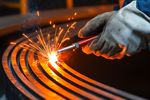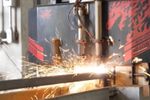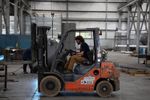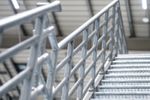Simply put, “metal fabrication” is defined as creating products or structures by cutting, bending, and/or assembling metal material. It’s largely considered a value-added process as it consists of putting together actual products or structures from metal raw material.
Jobs usually consist of three phases: 1) design, where shop drawings are created to the intended measurements; 2) fabrication, which involves the aforementioned cutting, bending, and/or assembling; and finally, 3) installation, where the end product or structure is put together (either partially or fully).
Metal fabricators typically work with a range of raw materials that may include different types of metal such as plate metal, expanded metal, welding wires and rods, and cast metal. In a nutshell, fabrication is a critical step in creating any sort of finished metal part or structure.
Fabricators generally work in either machine shops or designated metal fabrication shops that focus on everything from metal preparation to fabrication. Though not as common as the types of metal fabrication that we’ll discuss in this piece, blacksmiths, boilermakers, and ironworkers have also historically been considered metal fabricators.
There are various different segmentation levels which we’ll touch on in this post including hree of the most common types of metal fabrication: industrial, structural, and commercial.
What is Industrial Metal Fabrication?
As you likely can already guess, industrial metal fabrication is the process of integrating various parts or assemblies — typically made from sheets or plates — into industrial products.
Industrial fabricators typically serve industries such as aerospace, alternative energy, material handling, pollution engineering, water treatment, automotive, and more. The products they create are usually very large in scale and often include the likes of tanks, silos, and heavy machine parts.
Unlike structural metal fabrication, which we’ll get to in the next section, industrial metal parts are typically used as complements to one another.
What is Structural Metal Fabrication?
High-strength structural metal is one of the most popular materials used in the construction field today, whether the project is commercial, industrial, or residential in nature. Noting this, structural metal fabrication involves creating structural metal parts for these types of applications, such as I-beams.
Thanks to its ideal strength-to-weight ratio, steel is the most popular metal used in metal fabrication for structural purposes, as just about any type of construction project utilizes the material in some way, shape, or form.
In a commercial setting, the steel is likely what helps form the foundation. In fact, some of the most well-known buildings constructed with structural steel include New York City’s Empire State Building, the Sydney Harbour Bridge, and Dubai’s Burj Khalifa, the world’s tallest building.
Here’s a look at some of the types of metal parts that may be used for a structural project:
- Towers, or custom-made parts of a facility that enable more enhanced production
- Platforms, which often form a part of loading bays, storage locations, ramps, or decks in certain facilities
- Walkways (in industrial environments, walkways are typically required to meet various OSHA standards)
- Stairs, when durability and strength are a requirement in either a residential, commercial, or industrial setting
- Structural components that make up the main framework of a particular building (e.g., trusses, girders, and beams)
What is Commercial Metal Fabrication?
Commercial metal fabrication consists of creating the parts that are typically installed in commercial venues such as restaurants, stores, public spaces, and municipal buildings. Commercial metal products may include the following:
- Guardrails
- Awnings
- Shelving
- Sinks and other appliances
- Conveyors
Another type of commercial metal fabrication is decorative or ornamental metal. These types of metal products are typically designed for installation on the exterior of commercial buildings to give the facilities better aesthetics and more curbside appeal.
Compared to structural and industrial metal parts, commercial parts tend to be smaller and more precise in nature. However, they’re just as important to how a commercial entity operates, both from a functional standpoint and when it comes to keeping employees and customers safe.
Custom Metal Fabrication for All of the Above
As you can see, metal fabrication of many kinds plays critical roles in creating products and structures that businesses of all scales rely on.
As a custom metal fabricator, we’re proud to contribute our expertise to all of the metal fabrication segments reviewed above.
If you have an industrial, structural, or commercial metal fabrication project that needs a custom touch, please contact us today. Chances are, we’ll be happy to say, “Yes, we can do that!”





